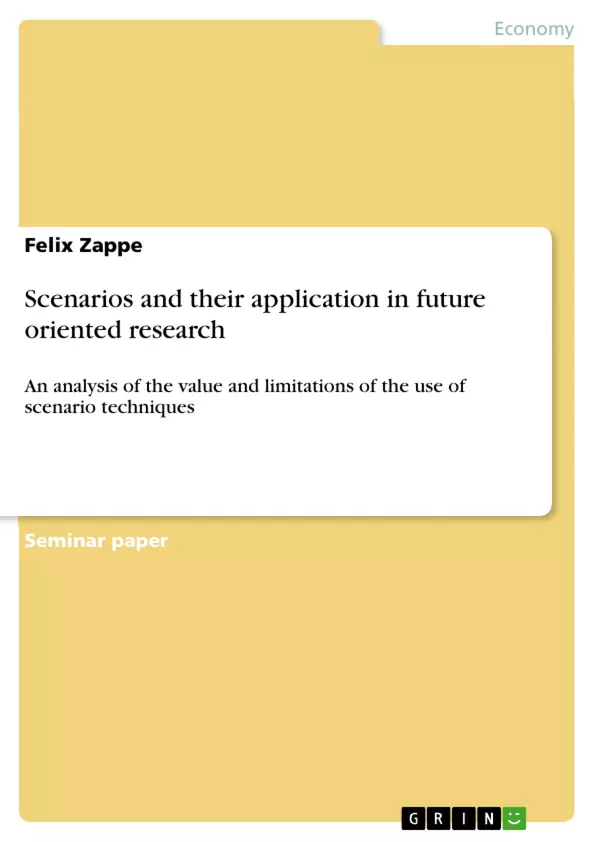This work introduces into scenario techniques, discusses its advantages and disadvantages and examines some common problems when conducting a scenario exercise on your own in a reflective part.
Inhaltsverzeichnis (Table of Contents)
- Introduction to the Scenario Technique
- Advantages and Disadvantages of Scenarios
- Reflections on Our Scenario Technique Application During Our Foresight Study
Zielsetzung und Themenschwerpunkte (Objectives and Key Themes)
This paper examines the scenario technique and its application in future-oriented research. It analyzes the strengths and weaknesses of this method, drawing on existing literature and the author's personal experience in utilizing it.
- The fundamental characteristics of scenario techniques
- The various types of scenarios and their applications
- The practical advantages and disadvantages of scenario analysis
- The importance of considering plausibility, differentiation, consistency, decision-making utility, and challenge when developing scenarios
- The role of scenario techniques in shaping corporate culture and fostering innovation
Zusammenfassung der Kapitel (Chapter Summaries)
Introduction to the Scenario Technique
This chapter defines the scenario technique, highlighting its key features and purpose. It explains how scenarios create distinct visions of possible futures by analyzing trends and underlying assumptions. The chapter also outlines the basic steps involved in constructing scenarios and highlights the importance of scenario transfer.Advantages and Disadvantages of Scenarios
This chapter dives into the different types of scenarios, differentiating between normative and explorative scenarios as well as qualitative and quantitative approaches. It examines the criteria for assessing the value of a scenario analysis and explores the advantages and disadvantages of using this technique.
Schlüsselwörter (Keywords)
The key terms and concepts covered in this text include scenario technique, future-oriented research, foresight, scenario analysis, trend extrapolation, assumptions, qualitative and quantitative approaches, scenario transfer, plausibility, differentiation, consistency, decision-making utility, challenge, corporate culture, and innovation.
Frequently Asked Questions
What is the scenario technique?
It is a method used in future-oriented research to create distinct visions of possible futures by analyzing current trends and underlying assumptions.
What is the difference between normative and explorative scenarios?
Explorative scenarios explore what *could* happen based on trends, while normative scenarios focus on a preferred future and how to reach it.
What are the main advantages of using scenarios?
Scenarios help in decision-making, foster innovation, and can help shape a more proactive corporate culture by preparing for various possibilities.
What criteria define a high-quality scenario?
A good scenario must be plausible, differentiated from others, internally consistent, useful for decision-making, and challenging to existing assumptions.
What is "scenario transfer"?
Scenario transfer refers to the step of applying the insights gained from a scenario analysis into actual strategic planning and organizational actions.
- Quote paper
- Felix Zappe (Author), 2017, Scenarios and their application in future oriented research, Munich, GRIN Verlag, https://www.grin.com/document/373562



